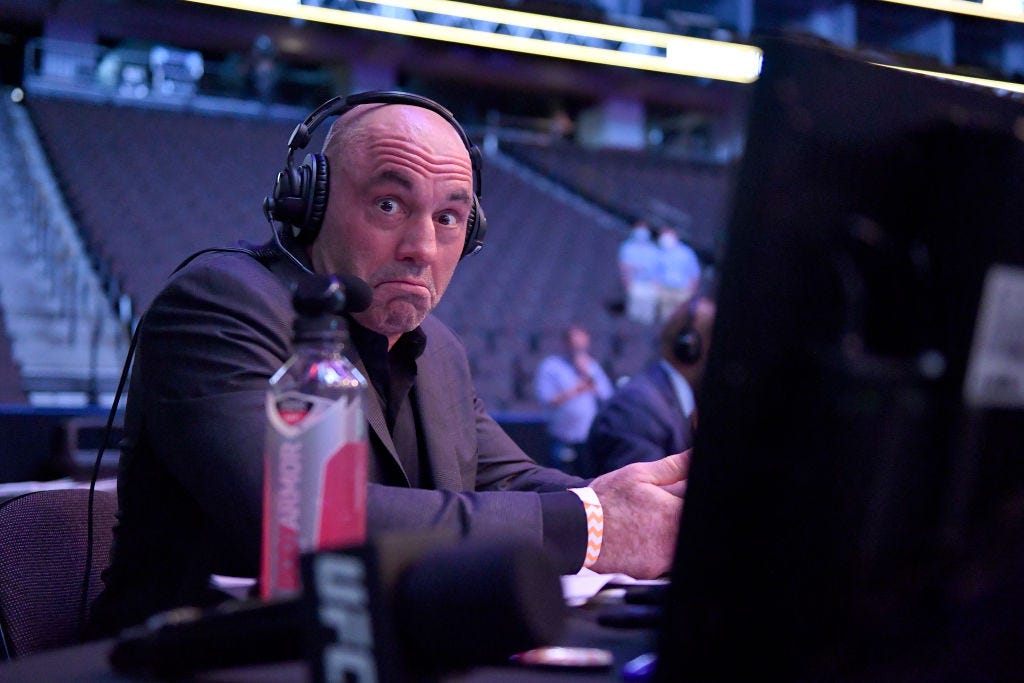Is ‘The Joe Rogan Experience’ Losing Its Edge?
The wildly popular podcast has some fundamental problems that ought to be addressed

The world is home to over 5 million podcasts. In the hyper-saturated landscape of podcasting, “The Joe Rogan Experience” (JRE) stands out as an undeniable juggernaut—the most-listened-to podcast in an extremely crowded field. Since its debut in 2009, it’s captivated audiences far and wide, from Los Angeles to Lagos, with its eclectic range of guests and unfiltered conversations.
Well, that used to be the case. Not anymore.
I write this as a long-time JRE fan, someone who has listened to the podcast on a regular basis for the best part of 10 years. As the show has evolved over time, a growing sentiment has emerged among listeners—that the once-thrilling podcast has become mundane and lackluster. At the heart of the podcast’s stagnation lies the issue of recurring guests who fail to bring fresh perspectives or engaging content to the table. While diversity in guest selection has been one of the show’s strengths, with a wide array of personalities spanning different fields and backgrounds, a subset of guests has become overly familiar fixtures on the podcast. The repetition of these individuals, who often recycle anecdotes and opinions without offering novel insights, has left many listeners disenchanted and craving the intellectual stimulation that characterized earlier episodes.
Take Mike Baker, for example. A former CIA agent turned commentator, Baker has emerged as a recurring guest, eliciting unfavorable reactions from viewers and listeners alike. Known for his evasive responses and reluctance to answer questions directly, Baker has drawn criticism in the YouTube comment sections of Rogan’s videos, with viewers expressing frustration over his elusive demeanor and perceived lack of substance. Comments such as “Mike Baker is the master of saying a lot without actually saying anything” and “Can we get a straight answer for once, Mike?” underscore the frustration felt by many viewers toward the security expert’s circuitous approach to conversation. As a former CIA agent with unique insights and experiences to share, Baker certainly has the background to make him a fantastic guest. Sadly, however, listening to a three-hour discussion with him is akin to torture, something an ex-CIA official likely knows a great deal about.
Furthermore, Rogan’s penchant for inviting fellow comedians onto the podcast—individuals who excel on stage but often falter in real-life conversations—has raised concerns about the show’s evolving dynamic and entertainment value. While comedians like Tim Dillon and Tony Hinchcliffe often bring humor and wit to the podcast, the vast majority of comics who appear on the show do not. In short, they are ill-equipped to handle long-form conversations, leading to instances of awkwardness and lackluster engagement.
The problems with JRE today are compounded by the show’s length, typically spanning three hours or more. While the podcast’s format initially allowed for in-depth discussions and the exploration of complex ideas, the excessive (and growing) length of episodes has led to a sense of fatigue among audiences. Three hours is a significant amount of time to commit to something, and Rogan expects listeners to do this on an almost-daily basis. In that time, a person could run a marathon or fly from New York City to Miami. As episodes drag on with periods of awkward silence and aimless meandering, listeners find themselves increasingly disengaged and impatient for conversations to reach meaningful conclusions.
As Rogan and his podcast grapple with these challenges, the show stands at a crossroads, faced with the imperative to revitalize its content and re-engage its audience. To combat the perception of repetitiveness, the show could benefit from a renewed emphasis on guest diversity—more politicians, more entrepreneurs, sports stars other than mixed martial arts fighters, more musicians, etc.—and a more discerning approach to selecting individuals with unique perspectives and fresh insights to share. In other words, no more Mike Baker types, please.
Additionally, in addressing the issue of episode duration, the podcast could explore alternative formats or structures that accommodate shorter, more focused conversations while maintaining depth and substance. Rogan, a truly gifted interviewer, could consider adopting a more streamlined approach to content delivery, condensing discussions into more digestible segments that prioritize quality over quantity. By striking a balance between depth and brevity, the podcast could enhance its accessibility and appeal to a broader audience while retaining its core commitment to meaningful dialogue and intellectual exploration.
“The Joe Rogan Experience” is a behemoth of a podcast, but with power comes responsibility—the responsibility of providing quality content that contributes to dialogue rather than obfuscating it. The show must do more to reward the millions of listeners around the world who dedicate three hours of their lives, many days a week, to tune in.



